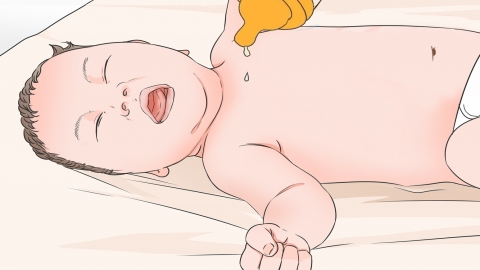What should I do if an infant's stool is sticky and mucous-like?
Infant stool resembling sticky mucus may be caused by factors such as cold exposure, indigestion, irritable bowel syndrome, bacterial enteritis, or viral enteritis. Parents should promptly take the infant to see a doctor and follow medical advice to provide symptomatic treatment based on the specific cause. Detailed analysis is as follows:

1. Cold exposure: In cold weather, infants exposed to low temperatures may experience intestinal contraction and slowed blood circulation, which can impair normal intestinal motility and result in sticky, viscous stools. It is recommended that parents apply a warm towel compress to the infant’s abdomen under a doctor’s guidance to help eliminate internal cold and relieve discomfort.
2. Indigestion: An infant's digestive system gradually develops after birth. If parents feed the infant foods that are difficult to digest, it may lead to indigestion. Some food may not be fully broken down or absorbed, resulting in mucus-like, sticky stools. Parents may, under medical supervision, administer medications such as Feier Pills or Xiaoshi Pills for children, while also adjusting the infant’s diet.
3. Irritable bowel syndrome (IBS): IBS is a functional gastrointestinal disorder that may cause abdominal pain, diarrhea, constipation, and abnormal bowel movements. Since infants have delicate digestive systems, consuming unhealthy foods may trigger bowel irregularities and produce greasy,黏sticky stools. Parents may use medications such as Mebeverine Hydrochloride Tablets or Alverine Citrate Capsules under a doctor’s guidance, while also ensuring proper dietary hygiene for the infant.
4. Bacterial enteritis: Consuming contaminated food may lead to bacterial enteritis in infants. Inflammation can irritate surrounding tissues, causing abnormal stools, abdominal pain, and other discomforts. Under medical guidance, parents may treat the infant with medications such as Amoxicillin Granules or Montmorillonite Powder, and avoid feeding the infant unclean or unsafe foods.
5. Viral enteritis: Infants have relatively weak immune systems. Without proper protection, they may become infected with viruses, leading to viral enteritis, which can cause symptoms such as abdominal pain, bloating, and changes in stool. Under a doctor’s direction, parents may administer antiviral medications such as Acyclovir Capsules or Oseltamivir Phosphate Capsules, and ensure the infant drinks plenty of fluids.
In daily life, parents should pay attention to the infant’s diet, keeping it light and healthy. They should also maintain good ventilation in the environment and appropriately adjust the infant’s clothing according to temperature changes.




